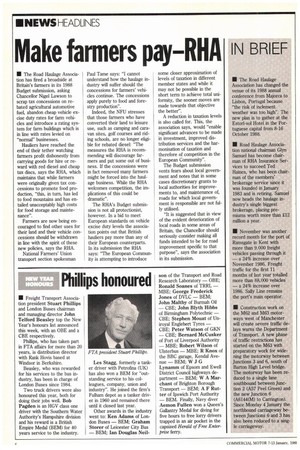Make farmers pay-RHA
Page 8

If you've noticed an error in this article please click here to report it so we can fix it.
IN The Road Haulage Association has fired a broadside at Britain's farmers in its 1988 Budget submission, asking Chancellor Nigel Lawson to scrap tax concessions on rebated agricultural automotive fuel, abandon cheap vehicle excise duty rates for farm vehicles and introduce a rating system for farm buildings which is in line with rates levied on "normal" businesses.
Hauliers have reached the end of their tether watching farmers profit dishonestly from carrying goods for hire or reward with red diesel and cheap tax discs, says the RHA, which maintains that while farmers were originally given tax concessions to promote food production, "this, in turn, has led to food mountains and has entailed unacceptably high costs for food storage and maintenance".
Farmers are now being encouraged to find other uses for their land and their vehicle concessions should be withdrawn in line with the spirit of these new policies, says the RHA.
National Farmers' Union transport section spokesman Paul Tame says: "I cannot understand how the haulage industry will suffer should the concessions for farmers' vehicles continue. The concessions apply purely to food and forestry production".
Indeed, the NFU stresses that those farmers who have converted their land to leisure use, such as camping and caravan sites, golf courses and riding schools, are no longer eligible for rebated diesel: "The measures the RHA is recommending will discourage farmers and put some out of business. If the concessions were in fact removed many farmers might be forced into the haulage business. While the RHA welcomes competition, the implications of this could be dramatic".
The RHA's Budget submission is not all protectionist, however. In a bid to meet European standards on vehicle excise duty levels the association points out that British hauliers pay more than any of their European counterparts. In its submission the RHA says: "The European Community is attempting to introduce some closer approximation of levels of taxation in different member states and while it may not be possible in the short term to achieve total uniformity, the sooner moves are made towards that objective the better".
A reduction in taxation levels is also called for. This, the association says, would "enable significant advances to be made in investment, improved distribution services and the harmonisation of taxation and therefore of competition in the European Community".
The Budget submission vents fears about local government and notes that in some cases discretionary grants to local authorities for improvements to, and maintenance of, roads for which local government is responsible are not fully utilised.
"It is suggested that in view of the evident deterioration of local roads in some areas of Britain, the Chancellor should seriously consider making all funds intended to be for road improvement specific to that purpose", says the association in its submission.
































































